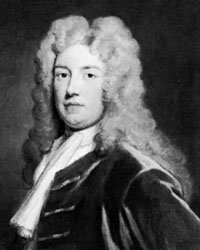|
Sir Robert Walpole (1721-1742) WHIG

For a long time in British politics, the two main parties were the Tories (now the Conservative party) and the Whigs (now the Liberal Democrats). The term Whig originates from the Exclusion Bill crisis of 1678-1681 - the Whigs were those who supported the exclusion of James VII and II from the thrones of England, Ireland and Scotland (the "Petitioners") and the Tories were those who opposed it (the Abhorrers). Both names were originally insults: a "whiggamor" was a cattle driver, and a "tory" was an Irish term for an outlaw. Generally, the Tories were associated with the landed gentry and the Church of England, while Whigs were more associated with the great noble houses, the moneyed interest, and religious dissent.Sir Robert Walpole was the first person to be regarded as Prime Minister. He was also the first person to live at 10 Downing Street, Whitehall, London, which was built in 1731. The sign on the door still says First Lord of the Treasury, which still applies to all Prime Ministers. He was born on 26th August 1676 at Houghton Hall, Norfolk. He was the third son of Colonel Robert Walpole and his wife Mary Burwell. Robert Walpole went to school at Great Dunham, Norfolk and Eton and later to King’s College, Cambridge. He married Catherine Shorter on 30th July 1700. In 1701 he became Whig MP for Castle Rising when he was twenty five and later became MP for King’s Lynn. In 1705 he was a member of the committee controlling the navy during the War of the Spanish Succession (1701-1714). He was made Secretary at War and later treasurer of the navy. There was a General Election in 1710 and the Tory Party came to power and Walpole was dismissed. He became a most effective Leader of the Opposition. In 1712 he was impeached and sent to the Tower of London and expelled from the House of Commons by the Tory leaders, The Earl of Oxford, and Viscount Bolingbroke. When George I came to the throne Walpole was made Paymaster General of the forces. In turn he was able to arrange the impeachment of Oxford and Bolingbroke for treason. In 1715 Robert Walpole became First Lord of the Treasury and Chancellor of the Exchequer. At the time of the financial disaster known as the South Sea Bubble, Walpole kept the government out of much of the ensuing trouble and bolstered public confidence. In 1721 Peter the Great became ruler of Russia and in 1722 Daniel Defoe wrote “Moll Flanders”. In 1724 Philip V gave up the throne in Spain and Catherine the Great became Czarina of Russia. Gin drinking became a problem in England. From 1721 Walpole was, in effect, what is now known as Prime Minister, although he did not use the term himself. His position became stronger when he dealt firmly with a plot to overthrow the government known as the Atterbury plot, after the name of the Bishop of Rochester who led the plotters. Their aim was to replace the Hanoverian kings by the Jacobites under Bonnie Prince Charlie. The Tories were branded as Jacobites and therefore would remain out of office until 1770. In 1726 Jonathan Swift wrote “Gulliver’s Travels” and in 1727 the Spanish tried to capture Gibraltar. Also in 1727 Sir Isaac Newton died. Charles Wesley started Methodism in 1729. When George II came to the throne in 1727, the new king wanted to dismiss Walpole. However, Queen Caroline favoured the Prime Minister and persuaded the king to keep him in office. After Queen Caroline’s death in 1737, Walpole began to lose the king’s favour.
Click on the 'Next' button below to continue...
|